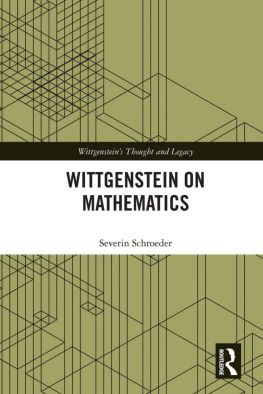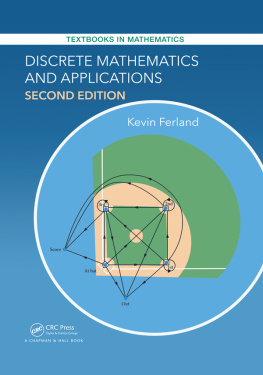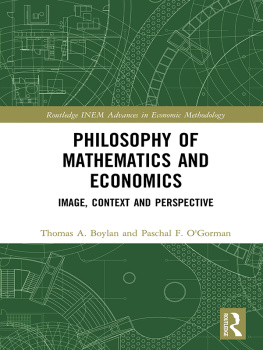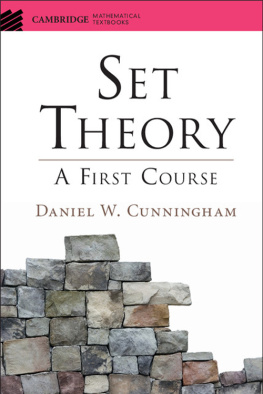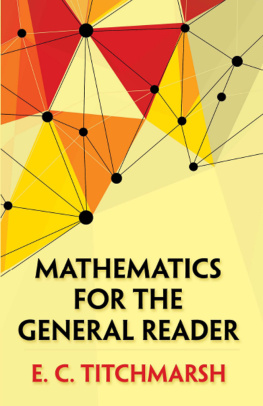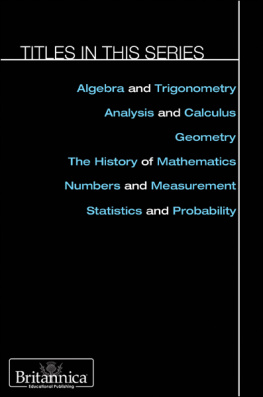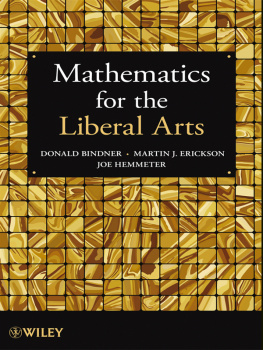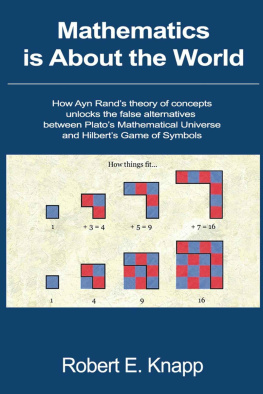The Mathematical Imagination


This work is licensed under a Creative Commons Attribution-NonCommercial-NoDerivatives 4.0 International License.
Through the generous funding of Michigan State University, this publication is available on an open access basis from the publishers website.
Fordham University Press gratefully acknowledges financial assistance and support provided for the publication of this book by Michigan State University.
Copyright 2019 Fordham University Press
All rights reserved. No part of this publication may be reproduced, stored in a retrieval system, or transmitted in any form or by any meanselectronic, mechanical, photocopy, recording, or any otherexcept for brief quotations in printed reviews, without the prior permission of the publisher.
Fordham University Press has no responsibility for the persistence or accuracy of URLs for external or third-party Internet websites referred to in this publication and does not guarantee that any content on such websites is, or will remain, accurate or appropriate.
Fordham University Press also publishes its books in a variety of electronic formats. Some content that appears in print may not be available in electronic books.
Visit us online at www.fordhampress.com.
Library of Congress Cataloging-in-Publication Data available online at https://catalog.loc.gov.
Printed in the United States of America
21 20 19 5 4 3 2 1
First edition
CONTENTS
The Mathematical Imagination
Humanists are learning mathematicsagain. Amidst a renewed sense of crisis in literary, cultural, and language studies, many humanists have turned to mathematics and digital technologies based on mathematical processes in hopes of modernizing and reinvigorating humanistic inquiry. Literary, cultural studies, and media studies scholars as well as historians are using algorithms to read novels, making digital maps to plot the geographies of films, using online tools to annotate and publish texts collaboratively, and applying other computational technologies to explore historical and literary records. According to proponents of such new methods, the so-called digital humanities promise to bring the analytic power of computation to bear on the study of culture and the arts, lending the humanities a more public face and, thus, renewed relevance in the early twenty-first century.
Of course, not everyone shares the digital humanists enthusiasm and optimism. One recent op-ed in The Atlantic alleges that the digital turn in the humanities simply reacts to economic worries about funding increases in and administrative emphasis on STEM fields (science, technology, engineering, and mathematics). If the digital humanities embrace the tech industry, do the humanities not also acquiesce to the merger of technology and industry, whose mechanisms of manipulation and control critical theory seeks to expose and oppose?
What often goes unacknowledged in these contemporary debates is the long history of similar disagreements over epistemology that date back to the very inception of critical theory. As Max Horkheimer (18951973) and Theodor W. Adorno (19031969) first conceived of it in the 1930s, critical theory steadfastly opposed the mathematization and quantification of thought. For them, the equation of mathematics with thinking, embraced by their intellectual rivals, the logical positivists, provided the epistemological conditions leading reason back into the barbarism and violence that culminated in World War II and the Holocaust. However, the fact that Horkheimer and Adorno interwove mathematics with the dialectics and downfall of enlightenment obscures how mathematics provided some of their intellectual forerunners and friendsGershom Scholem (18971982), Franz Rosenzweig (18861929), and Siegfried Kracauer (18891966)with concepts, metaphors, and tools that helped negotiate the crises of modernity. Although Scholem, Rosenzweig, and Kracauer are not often counted as critical theorists, we can find in their work the potential for theory that is at once mathematical and critical. In particular, their theories of aesthetics, messianism, and cultural critique borrow ideas from mathematical logic, infinitesimal calculus, and geometry to theorize art and culture in ways that strive to reveal and, potentially, counter the contradictions of modern society. By revisiting and rethinking the origins of critical theory, this book seeks to recapture the potential contribution that mathematics holds for the critical project. To understand the influence of mathematics on Scholem, Rosenzweig, and Kracauer is to uncover a more capacious vision of critical theory, one with tools that can help us confront and intervene in our digital and increasingly mathematical present.
The Eclipse of Mathematics in Critical Theory
In 1935, Edmund Husserl saw the world of reason that he had helped construct crumbling before him. A founder of the philosophical school of phenomenology earlier in the century, Husserl held a series of lectures that year in Prague recounting how, over time, the positivistic special sciences had eliminated all the genuine problems of reasonthe question of rational knowledge, the ethics of truly good action, and the notion of values as values of reason. At some point, Europeans had traded a mode of thinking genuinely concerned with reason, ethics, and valuesthe basic questions of humanity and their meaning in lifefor the facts of science and the formulae of mathematics. First published in Belgrade as Die Krisis der europischen Wissenschaften und die transzendentale Phnomenologie (The Crisis of the European Sciences and Transcendental Phenomenology, 1936), these lectures took on a very different tone than Husserls other introductions to phenomenology, not least because they could not be delivered or published in Nazi Germany (Husserl was of Jewish descent). Husserl died in April 1938; a year later, Germany invaded Prague on its way to total war.
Europe and its sciences had, of course, been in crisis for decades. A crisis of language ( Sprachkrise ) had plagued the intellectual life of fin-de-sicle Vienna, inspiring the work of poets such as Hugo von Hofmannsthal, cultural critics such as Fritz Mauthner, and philosophers such as Ludwig Wittgenstein. For these thinkers, language no longer offered a reliable means of capturing and communicating experience and thought, the more problematic aspects of which Wittgenstein famously recommended that we pass over in silence. Just a few years later, by the time Husserl delivered his lectures in Paris and Prague, the implications and potential consequences of this latest crisis in Enlightenment thoughtin terms of politics, reason, and the relationship between the twohad become much more severe.
For Husserl, the crisis in the European sciences was no less than a crisis in reasonable society as a whole. At stake was civilization based on human values and thoughts, a rational civilization, that is, one with a latent orientation to reason. Two decades later, the ever-worsening political situation meant, for Husserl, that the task of philosophy now lay in locating and correcting the moment at which this totalized, scientific worldview had gone astray.
In Husserls eyes, this crisis represented not a sudden change in how people understood humanity as ushered in by the rise of authoritarianism in Germany, but rather a change that had taken root centuries before, in the work of Galileo. What was decisively new with Galileo was the idea that the limited application of geometry to astronomy could be extended to the world as the mathematization of nature , in which nature itself is idealized under the guidance of the new mathematics; nature itself becomesto express it in a modern waya mathematical manifold. A number of elements in these two passages resonate with contemporary readers, especially with critical theorists. We register not only a deep ambivalence toward the total mathematization of our everyday life world but also how this foundational shift exchanges knowledge as the comprehension of meaning in the only real world for inquiry into mathematized nature. Moreover, as this change passes from physicist to physicist we recognize the reification of this unspoken shift, the transformation of historical choices into the way we interpret nature itself. For Husserl, this link between the mathematization of nature and the ever-worsening situation in Germany and across Europe was not explicitly causal. Instead, it provided the conditions to understand and, potentially, return to and correct the point at which we began to foreclose the investigation of our everyday life world and the consequences of that for humanity.
Next page

